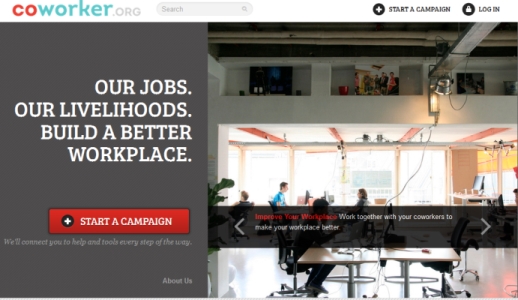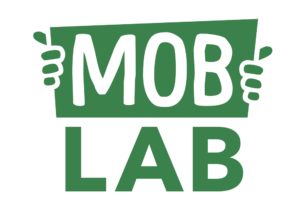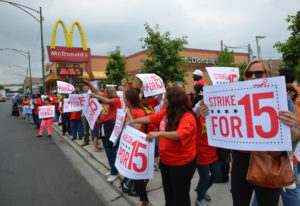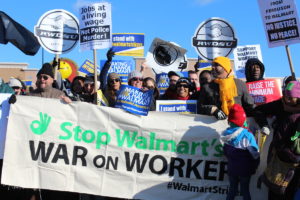When the Wisconsin Uprising emerged in January of 2011 turning Wisconsin’s state capitol in Madison into an occupation of labor supporters and others defending collective bargaining rights, one thing became clear to Coworker.org co-founder Jessica Kutch.
“Folks inside the labor movement were all pretty shocked. There was an expectation that union members would take action, but what we didn’t expect was that everyone else would too,” she said in an interview with Mobilisation Lab.
“Suddenly, there were people who were speaking out for collective bargaining that likely didn’t have those same rights in their workplaces. Or students that would graduate into the workplace that would not have those rights.”
What that meant to Jessica, 31, was that her five years leading digital campaigns for the Service Employees International Union was going to come to an end. She and her friend and co-worker Michelle Miller, 33, began talking about how they could tap into the energy and excitement of the Madison occupation.
“We wanted to help arm those individuals with the tools and training to be able to go back into their own workplaces and start organizing,” she says.
Jessica took a job organizing economic justice campaigns — many of them worker-led campaigns — with Change.org.
That’s where she met Anthony Hardwick, a Target employee from Nebraska.
Lessons from a Grassroots Worker Campaign
Anthony never dreamed he’d organize a nationwide petition against his employer, but when the Nebraska resident arrived at work two weeks before Thanksgiving 2011 to be told he would not have the day off to spend in holiday activities with his family, that’s exactly what happened.
He searched online for worker petitions and found Change.org. His petition, Tell Target to Save Thanksgiving, drew national attention from 200,000 Target and non-Target workers who supported it. While the petition didn’t persuade Target to return to its custom of closing a portion of Thanksgiving Day, Anthony’s campaign provided data points that Jessica said she could not ignore.
Within days, the campaign had garnered local and national media attention on both ends of the political spectrum.
“Almost all of it was sympathetic,” Jessica says. “Not only was it sympathetic but it was talking about the workers’ grievances, not the politics between the union and the employer. It was focusing on the issue.”
Jessica says the fact that many of the petition-signees voluntarily self-identified as Target employees proved that not only were workers ready to organize online, but that the momentum was building to support an innovation outside the traditional labor movement.
That momentum extended to a Target warehouse worker in Minnesota, Seth Coleman, 45 minutes away from Target head offices.
Because Anthony was unable to get to Minnesota to deliver the petition, Jessica, as part of Change.org, flew it there, and drove Seth to the head offices.
It was clear on that drive, Jessica says, that Seth was afraid, yet when she asked him why he was delivering the petition, he told her he felt you need to move to action when you are called to do so.
“It was a reminder that we need to ask people to do things,” she says. “It opened my imagination to the power of this model.”
Jessica had greater difficulty, though, once the campaign ended and Target reduced Anthony’s hours enough to make it pointless for him to continue working there. Despite the millions of people organizing through Change.org, Jessica says she was at a dead-end in terms of being able to offer that deep support to workers once a campaign closed.
Workers who are organizing against their employers need far more support than a 17-year-old trying to ban plastic bags, she says.
“I decided the idea I’d been talking about with my friend for nine months was something I had to try my best to make a reality.”
Building Power for Workers
She and Michelle began having serious conversations with stakeholders and labor leaders. They quit their jobs and funded the next part of the year through fellowships, Miller from Georgetown University’s Kalmanovitz Initiative for Labor and the Working Poor and Jessica through the New Organizing Institute.
The pair has had positive results in finding support for their endeavor.
“The worker movement as a whole seems more open to experimentation than it’s ever been before,” Jessica says.
Union membership has declined to 6.6 per cent in the private sector, from 32 per cent at its peak. Coupled with what Jessica calls a decline in working conditions, stagnant wages and shrinking opportunities for job mobility, workers are in dire need of positive power, she adds.
“Workers have no leverage against their employers and employers know this,” Jessica says, using Anthony, whose hours at Target were eventually cut to about one a week as an example. “It’s a slow march backwards and workers are increasingly dissatisfied.”
The goal for Coworker.org now is to mobilize workers through digital strategies such as online petitions and, beyond that, to track users so they can offer deeper support.
Jessica says that means being available beyond campaigns to offer legal resources and other supports, through a sustainable funding model that Jessica and Michelle are still working out.
“I believe the future of Coworker.org will come into view later,” Jessica says. “Our job right now is to build as much power as we can in this model and leave the doors wide open for what’s next.
“We have to get to the point where workers are winning again so they can imagine the future.”
— This is article is part of a series exploring mobilisation innovations in unions
Related posts:
How Walmart workers are making change at world’s largest retailer
Is the new organizing friend to friend?
Stay Connected: @teamcoworker @jess_kutch @michelleimiller
Do you have an innovation in mobilisation and people-powered campaigns? Share it with Mob Lab by contacting moblab@greenpeace.org.
Categories:
organising, mobilising and engagement



